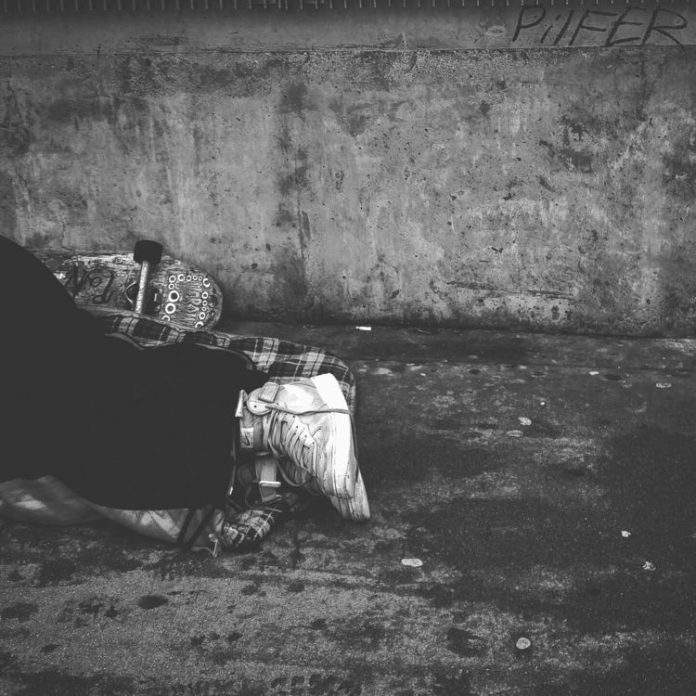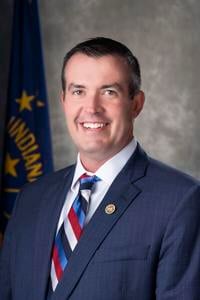-
Homelessness intervention organizations are seeking new ways to help unhoused people after two bills that attempted to criminalize homelessness in Indiana nearly passed at the 11th hour of the 2025 legislative session.
Senate Bill 197 originally passed through the Indiana Senate to deal with unsafe buildings, and intended to focus on charging the owners of these types of buildings with civil penalties. However, in the House, an amendment was added that would make it so “a person may not camp, sleep, or use for long term shelter land owned by the state or a political subdivision, unless the land has been authorized for that use under (Indiana code).”
Rep. Jennifer Meltzer, R-Shelbyville. Because of that amendment, any homeless person who decided to sleep or camp on public property such as bridges, sidewalks, and buildings owned by the state could have faced a Class-C misdemeanor with a penalty of 60 days in jail or a $500 fine.
Rep. Jennifer Meltzer, R-Shelbyville, proposed the amendment, which had language that came fromHouse Bill 1662, a bill that was created with the original intent of criminalizing homelessness. It died in committee earlier in the 2025 legislative session.
After Meltzer attempted to amend homelessness criminalization language into SB 197, Sen. Aaron Freeman, R-Indianapolis, filed a dissent on the bill causing it not to pass before the session ended on April 24.
Sen. Aaron Freeman, R-Indianapolis. Rep. Jennifer Meltzer did not comment on her decision to add language to SB 197.
Cicero Institute, a Texas think tank founded and run by billionaire tech investor Joe Lonsdale was a major advocate for legislation that would criminalize homelessness. Mirror models of legislation written by Cicero Institute were introduced in Kentucky, Florida and Texas in May of 2024 and ultimately passed.
In June of 2024, The U.S. Supreme Court ruled that punishing a person for sleeping on public property, despite having no place to go, did not violate the eighth amendment of cruel and unusual punishment. This decision has ultimately caused states’ legislatures across the country to introduce over 320 bills criminalizing unhoused people in just the past year, with about 220 of them passing.
Chelsea Haring-Cozzi, Chief Executive Officer of Coalition for Homelessness Intervention and Prevention (CHIP) said there are other options out there to help reduce homelessness.
“This is a critical moment for us to demonstrate an alternative to criminalization. To say jail is not the answer, finding people who are already struggling solves nothing,” Haring-Cozzi said. “Putting people in jail solves nothing, because what happens when they come out, they still have nowhere to go. Let us show you, if we have resources, what housing and services can do.”
CHIP runs a program called Streets to Home, which aims to end chronic homelessness in Indianapolis by 2028. It’s working with the Indianapolis Housing Agency to help secure permanent housing for homeless people.
“The larger plan around Streets to Home is really what would it look like to end chronic homelessness in Indianapolis over the next couple years, starting with people who are unsheltered, and on the streets,” said Haring-Cozzi. “[Homeless people with no shelter] are more likely to be victims of violent crimes or targeted because, again, there’s no safe place to shut and lock the door. So, we really want to start with those who are most vulnerable. We’ve got to do something really targeted and intentional.”
As lawmakers continue to debate new approaches, Haring-Cozzi emphasizes long-term strategies. Programs like Streets to Home aim to demonstrate how housing and support services can help reduce chronic homelessness in Indianapolis.
Luke Shepherd is a reporter for TheStatehouseFile.com, a news website powered by Franklin College journalism students.








I like the PC “unhoused” to describe the homeless. If you live in an apartment, aren’t you “unhoused”, also. This is the “journalism” taught at Franklin College which doesn’t include the old saying “words mean something”.
Homeless means homeless. Let’s figure out why and what triggers it and try to resolve the issue(s).
Comments are closed.